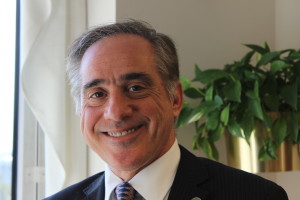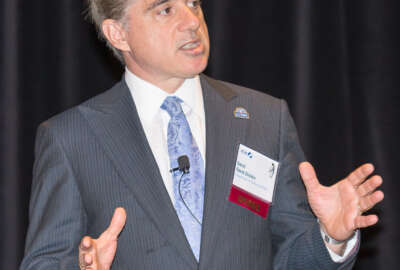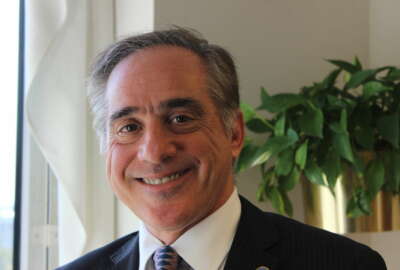
Exclusive
VA pitches ‘fundamental shift’ in veterans’ health care to Congress
VA wants to focus on the specialized care related to veterans' service that other facilities cannot do. But it may stop providing services commonly found elsewhere.
The Veterans Affairs Department will meet veterans’ health care needs through closer coordination with outside hospitals, clinics and doctors, the department says in a plan it must send to Congress by Sunday .
It is an admission that VA will never be able to meet all of veterans’ health care demands on its own. Rather, the department will focus on specialized care related to veterans’ service that other facilities cannot replicate. It may stop providing services commonly found in the health care industry.
“This is a fundamental shift in the way we think health care will be delivered to veterans for the next 20 years,” said Dr. David Shulkin, under secretary of health at the VA. He offered a preview of the plan in an exclusive interview with Federal News Radio.

Congress created the Veterans Choice Program after learning last year that VA clinics were falsifying appointment logs to disguise delays in patient care. The Choice Program lets veterans seek help outside the VA when certain conditions are met.
Since the law’s creation, VA has fulfilled an additional 7 million appointments, with 4.5 million of those through external providers. Nonetheless, veterans in some regions continue to wait too long for treatment. As of Oct. 15, nearly 200,000 patients had been told they would have to wait at least two months longer for appointments than they preferred.
The new plan goes beyond the Choice Program. Whereas now the VA tells patients to “go and find care anywhere,” Shulkin said, it will soon tell them to “find it among the best.”
“We need to have a formal system of care coordination so that we have the responsibility and know where vets are getting care, that they’re not getting gaps in care or that they’re not having missed appointments,” he said. “This is building an infrastructure to allow patients to get care seamlessly between the private sector and VA.”
That’s already happening with veterans with chronic or complex issues. But their numbers are small. To expand the program, VA will need more resources and staffing, plus external health care providers who are willing to work with the department’s bureaucracy.
The latter does not bother Shulkin, who ran hospitals in New York and New Jersey before coming to the VA in July. His pleas have been well received in meetings with medical centers, universities and companies, he said.
“I’ve not had anyone slam the door on me,” he said. “If anything, they say, ‘You’re hard to work with. Offering help to federal government is not easy.'”
VA Secretary Bob McDonald and other leaders recognize the problem and are committed to changing it, he said.
“We understand we need to have strategic partners and we need to be easier to work with,” he said.
The question of resources is more troubling. The cost of medicine and health care technology keeps rising. Earlier this year, VA nearly ran out of money. It threatened to shutter some health clinics. Officials blamed it on unforeseen demand for services, particularly a costly new Hepatitis C treatment. To avert a crisis, Congress reluctantly permitted the department to reprogram funds intended for the Choice Program.
In addition to money, the VA is struggling with human resources. It has launched an intense campaign to recruit medical staff. By and large, that has worked, Shulkin said. But nearly half — 43 percent — of VA regional networks and a quarter of its medical centers lack directors.
When he ran private hospitals, Shulkin said he regularly received recruiting calls from other institutions. The VA doesn’t do that. It waits for applicants to answer job ads posted at the government’s hiring website, USAJobs.gov. High-achieving medical directors don’t look there, he said.
Noting the recruiters, he said, “We need to think more like the private sector. I need to make sure we’re doing a better job of getting the word out that this is a great way to serve your country.”
Copyright © 2025 Federal News Network. All rights reserved. This website is not intended for users located within the European Economic Area.
Related Stories

VA’s top health official’s five ways to transform access to care



